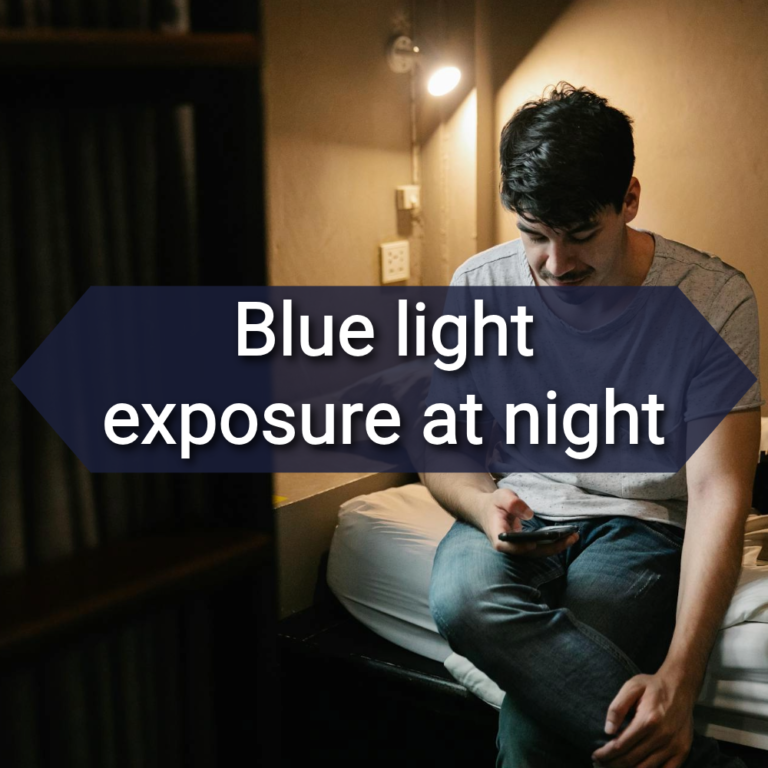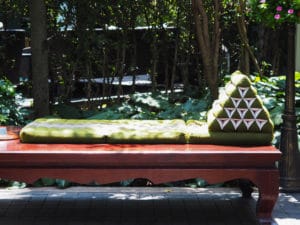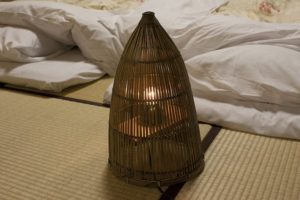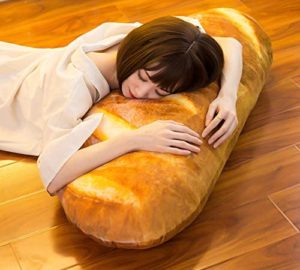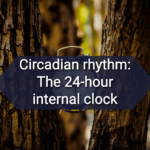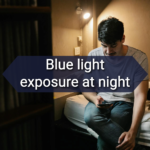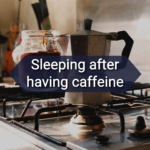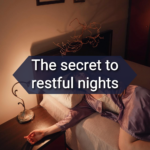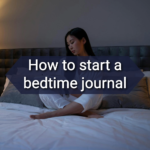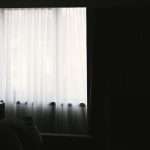Did you know that the average American spends over 7 hours a day staring at screens? That’s a lot of exposure to blue light, and it’s having a bigger impact on our sleep than many of us realize. In fact, a study found that 95% of people use some type of electronic device within an hour of bedtime.
If you’re among this vast majority, you might be unknowingly compromising your sleep quality night after night.
But fear not! Understanding the intricate dance between blue light and your body’s sleep-wake cycle is the first step towards better sleep and improved well-being.
In this comprehensive guide, we’ll explore the science behind blue light, its effects on your sleep, and most importantly, how you can harness this knowledge to transform your nighttime routine and wake up feeling refreshed and energized.
Key Takeaways
- Blue light exposure, especially from electronic devices, can disrupt your natural sleep-wake cycle.
- Limiting blue light exposure in the evening can help improve sleep quality and duration.
- Simple strategies like using blue light filters and adjusting device settings can mitigate the effects of blue light on sleep.
- Exposure to natural blue light during the day can actually improve sleep and overall health.
- Blue light blocking glasses may help reduce the negative effects of nighttime blue light exposure.
What is blue light?
Blue light is a high-energy, short-wavelength light in the visible spectrum, ranging from 380 to 500 nanometers. It’s naturally emitted by the sun and artificially produced by LED lights, fluorescent bulbs, and electronic devices like smartphones, tablets, and computers.
The science behind blue light and sleep
Our bodies have evolved to respond to natural light cycles, with blue light playing a crucial role in regulating our circadian rhythms. Here’s how it works:
Melatonin suppression
Blue light exposure, especially in the evening, suppresses the production of melatonin, the hormone responsible for making us feel drowsy. This can trick our brains into thinking it’s still daytime, making it harder to fall asleep.
Circadian rhythm disruption
Chronic exposure to blue light at night can throw off our internal body clock, leading to sleep disorders and other health issues. This misalignment can affect not just our sleep quality but also our overall well-being.
Increased alertness
Blue light stimulates parts of the brain that make us feel alert, elevating body temperature and heart rate. While beneficial during the day, this effect becomes problematic when we’re trying to wind down for sleep.
Where does blue light come from?
Understanding where blue light comes from is the first step in managing its impact on our sleep. Common sources include:
- Sunlight (the largest natural source)
- LED and fluorescent lighting
- Smartphones and tablets
- Computer monitors
- Television screens
- E-readers
- Video game consoles
Pro tip: While electronic devices are often blamed for sleep issues, remember that natural daylight exposure is crucial for maintaining a healthy sleep-wake cycle. The key is managing your blue light exposure, not eliminating it entirely.
How do electronics affect sleep?
Exposure to blue light, particularly in the hours leading up to bedtime, can have several negative effects on sleep:
- Delayed sleep onset: It takes longer to fall asleep due to suppressed melatonin production.
- Reduced REM sleep: The quality of sleep may suffer, with less time spent in restorative REM stages.
- Daytime fatigue: Poor sleep quality can lead to feeling tired and less alert during the day.
- Mood changes: Disrupted sleep patterns can contribute to irritability and mood swings.
The broader health implications of blue light exposure
While sleep disruption is the most immediate concern, chronic exposure to blue light at night has been linked to other health issues:
- Increased risk of obesity
- Higher chances of developing diabetes
- Potential connection to certain types of cancer
- Exacerbation of mood disorders like depression
It’s important to note that these associations are still being studied, and more research is needed to fully understand the long-term health impacts of blue light exposure.
Strategies to reduce blue light exposure
Fortunately, there are several practical steps you can take to reduce the impact of blue light on your sleep:
- Establish a digital curfew: Set an alarm to remind you to turn off electronic devices 2-3 hours before bedtime.
- Use blue light filters: Enable night mode or install blue light filtering apps on your devices.
- Adjust device settings: Dim the brightness of your screens in the evening.
- Invest in blue light blocking glasses: Consider wearing amber or brown-tinted lenses in the evening to filter out blue light.
- Optimize your sleep environment: Use dim, warm-colored lighting in your bedroom and consider blackout curtains to block outside light.
- Choose the right bulbs: Opt for warm-colored LED bulbs or traditional incandescent bulbs for evening use.
- Increase daytime light exposure: Spend time outdoors or near windows during the day to help regulate your circadian rhythm.
Pro tip: If you must use devices late at night, try the 20-20-20 rule: Every 20 minutes, take a 20-second break to look at something 20 feet away. This can help reduce eye strain and remind you to limit screen time.
Is blue light exposure always bad?
It’s crucial to remember that blue light isn’t all bad. During the day, exposure to blue light has several benefits:
- Boosts alertness and cognitive function
- Elevates mood and energy levels
- Helps regulate the circadian rhythm when exposed at the right times
- Supports children’s eye development
The key is to balance your exposure: embrace blue light during the day and limit it in the evening.
Are children more sensitive to blue light?
Children may be more susceptible to the effects of blue light due to their developing eyes. Parents should be especially mindful of their children’s screen time, particularly before bed. Encouraging outdoor play during the day and establishing consistent bedtime routines can help mitigate the effects of blue light on children’s sleep patterns.
Best apps and accessories to combat blue light
Blue light filtering apps
- f.lux (for Windows, Mac, Linux, iOS)
- Automatically adjusts your display’s color temperature based on the time of day
- Gradually shifts to warmer colors in the evening
- Customizable settings for personal preference
- Twilight (for Android)
- Filters the flux of blue light from your device
- Offers a gradual transition to warmer colors as the day progresses
- Includes options for different profiles and filter intensities
- Night Shift (built-in for iOS and macOS)
- Automatically shifts display colors to warmer hues in the evening
- Can be scheduled or manually activated
- Integrates seamlessly with Apple devices
Pro tip: While these apps can be helpful, they’re not a substitute for reducing overall screen time before bed. Use them in conjunction with other blue light management strategies for the best results.
Accessories for blue light protection
- Blue light blocking glasses
- Come in various styles and tints
- Can be worn over prescription glasses
- Look for options that block 90% or more of blue light
- Screen filters
- Physical filters that attach to device screens
- Available for smartphones, tablets, and computer monitors
- Reduces blue light without significantly affecting color quality
- Blue light blocking light bulbs
- LED bulbs designed to emit less blue light
- Great for bedroom and evening use
- Often have adjustable color temperatures
- Sleep-friendly smart bulbs
- Can be programmed to shift to warmer colors in the evening
- Often controllable via smartphone apps
- Some can simulate sunrise for more natural waking
- E-reader with blue light filter
- Devices like the Kindle Paperwhite offer built-in blue light filters
- Provides a more sleep-friendly reading experience compared to tablets or phones
Remember, while these apps and accessories can help reduce blue light exposure, they work best as part of a comprehensive sleep hygiene routine. Combine their use with good sleep habits, like maintaining a consistent sleep schedule and creating a relaxing bedtime routine, for optimal results.
Frequently Asked Questions
Are all sources of artificial light equally disruptive to sleep?
No, lights with more blue wavelengths (like LEDs and fluorescents) tend to be more disruptive than warmer, amber-colored lights.
How long before bed should I stop using electronic devices?
Ideally, you should avoid blue light exposure 2-3 hours before bedtime to allow your body to naturally produce melatonin.
Can blue light filtering apps and screen protectors completely solve the problem?
While these tools can help, they don’t eliminate all blue light. It’s best to combine their use with other strategies like reduced screen time before bed.
Conclusion
In our technology-driven world, managing blue light exposure is crucial for maintaining healthy sleep patterns and overall well-being. By understanding the science behind blue light and implementing strategies to mitigate its effects, you can take control of your sleep quality and reap the benefits of restful nights.

